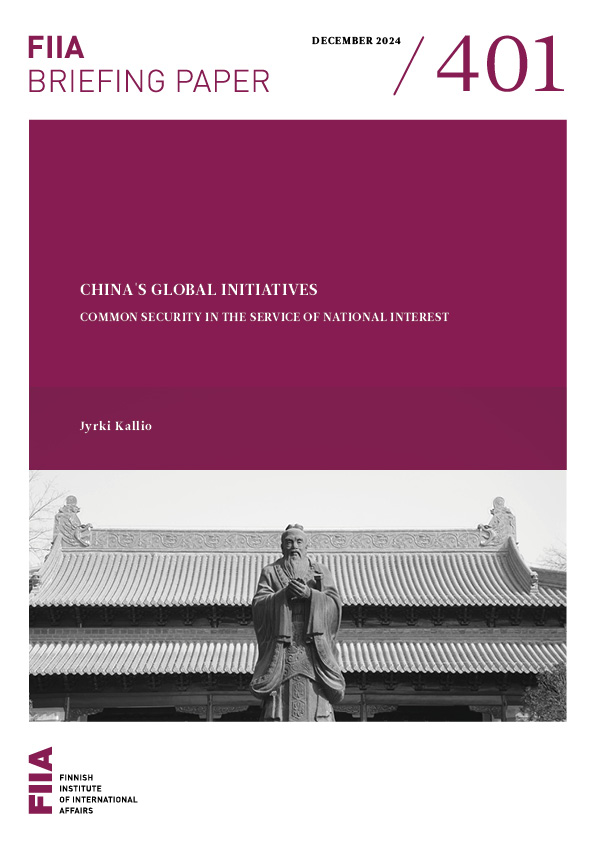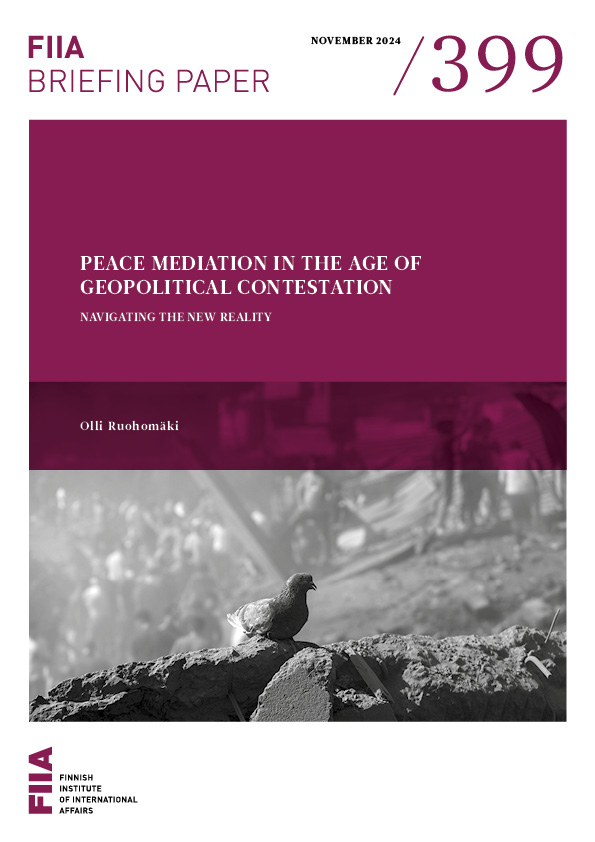How the Paris agreement is perceived in the public eye has consequences for later events – in terms of good and bad publicity, political pressure, momentum, and hope. In more concrete terms, it will have impacts on countries’ political opportunities to strengthen their national contributions, as well as on the credibility of the UN climate regime as a whole.
By ratcheting up the expectations, for example by suggesting that the Paris meeting should immediately set up a global market for carbon, some industrial interest groups are looking for an outcome that ‘disappoints’ them after the meeting. In short, these constituencies want to see the Paris meeting ‘fail’.
Several progressive actors, in a seemingly similar vein, also set very high expectations for the multilateral UN process. These constituencies ramp up the expectations in the hope of maximizing the political pressure on governments and thus enabling meaningful compromises on the international level.
In the mainstream view, the most important functions of the Paris agreement include providing transparency and a predictable framework for countries’ emission reductions. Reaching agreement on these will require compromises on perennial, and highly political, issues: differentiation in the obligations between developed and developing countries, and how to mobilize support for developing countries.
It is tempting to think that in case the negotiations with the UNFCCC’s near universal membership fail, a small group of global powers could cut a deal. However, this will be the case only if the UNFCCC stumbles procedurally. If the interests of great powers are too diverse, and domestic support for climate action too weak, changing the room and number of players will do little to help.
The UN Climate Change Conference in Paris (COP-21) in December 2015 presents an opportunity to strengthen the multilateral response to the enormous challenge of global climate change. World leaders, diplomats, the media, as well as civil society and industry representatives will travel to Paris for the biggest climate conference since the Copenhagen meeting in 2009. Six years ago, when the Copenhagen airspace was shut down due to the arrival of Air Force One, it was finally evident that climate change had become a real issue in global high politics.
The Paris climate meeting in 2015 is, in many ways, different from its notorious predecessor. Most importantly, great powers the US and China are making significant advances in their domestic climate policies, and have developed common high-level diplomatic initiatives and cooperation. However, just like before Copenhagen, Parties, stakeholders and commentators have widely diverging expectations and criteria for the success of the forthcoming mega-meeting.
The climate change negotiations under the United Nations Framework Convention on Climate Change (UNFCCC) are taking place against the backdrop of the continuing growth of global greenhouse gas emissions1, the already observable impacts of climate change, and the risk of runaway climate change, in which climate change becomes self-reinforcing. It is undeniable that national and international efforts to address climate change, taken together, have proved to be grossly inadequate to date. Many reports from leading scientists and research institutes stress the imminent dangers that the world is facing due to melting glaciers, rising sea levels, reduced food supplies, as well as the expected increases in extreme events that climate change is stimulating.2
Expectations for the Paris meeting and the whole UNFCCC process are influenced by this anxiety. However, the expectations for the meeting are also political in a narrow sense: different stakeholders use them to push forward their interests. The objective of this briefing paper is to provide an analysis of the politics involved in the Paris expectations, and the challenges in measuring the success of the Paris meeting. The paper argues that although the Paris meeting is likely to confirm the goal of keeping global warming within 2°C of pre-industrial levels, this is not the relevant yardstick for its success. Rather, difficult as it may sound, the proper way to approach the question is by thinking of an international framework that can contribute to strengthening the political will of key countries, and steering their policies in the future.
How Paris is perceived will also have implications for the credibility of the UN-based climate regime. The debate on more effective negotiations outside the UNFCCC is likely to resurface. The UN should be complemented by non-UN minilateral cooperation, especially among major emitters, and particularly as ‘coalitions of the willing’. These forums, however, are unlikely to change the most significant barriers to collective action.
The politics of Paris expectations
How the Paris agreement is perceived in the public eye has consequences for later events – in terms of good and bad publicity, political pressure, momentum, and hope. In more concrete terms, it will have impacts on countries’ political opportunities to strengthen their national contributions in the short term, as well as on the credibility of the UN climate regime as a whole. In particular, the interpretation of the success or failure of the Paris meeting is central to the EU, which is set to decide on its 2030 targets in light of the outcome.
As usual, some countries will travel to Paris looking for a strong outcome in issues such as mitigation, transparency and finance, while others will merely seek to minimize potential losses in their international credibility. Furthermore, some remarkably ambitious expectations have been set for the Paris meeting by various constituencies. Many stakeholders, from the business community and environmental NGOs alike, have submitted interesting and detailed proposals.

One complicating factor to declaring success upon a UN climate conference is the difficulty and complexity of the UNFCCC procedures themselves.
Photo: Library of Congress
It is worth emphasizing that many business associations, such as Business Europe3, and environmental NGOs, such as Greenpeace and others4, are not cynical or naïve in their expectations, but engage constructively, and know very well the main possible outcomes of crunch UN meetings.
However, some stakeholders, including some European industry representatives, seem to set the bar cynically high. The International Federation of Industrial Energy Consumers, for example, sees the Paris meeting as a success only if it achieves ‘binding overall targets for all countries and emerging emissions trading in all countries committed to full auctioning’.5 By ratcheting up the expectations and suggesting that a UN meeting should set up a global market for carbon, these interest groups are looking for an outcome that ‘disappoints’ them after the meeting. In short, these constituencies want to see the Paris Meeting ‘fail’.
A failure in Paris would alleviate the political pressure on the EU to raise the ambition of its emission reduction pledge for 2030, and a similar mechanism of undermining national ambition would work elsewhere as well. A perceived failure in Paris would slow down countries’ efforts to increase ambition in the presence of a persistent collective action problem. The collective action problem is easily politicized: accusing others (typically China or the US) of free-riding is a powerful argument in the domestic discussions of many key countries.
Several progressive actors, in a seemingly similar vein, also set very high expectations for the multilateral UN process. Some advocates will characterize the Paris agreement as a failure if it does not lead to an immediate decrease in emissions. For example, some wish that the Paris meeting would ensure that proposed contributions by countries add up collectively to the agreed target of keeping the global temperature increase below 2°C compared to pre-industrial levels.
Others formulate the goal in a slightly more ambiguous, yet highly ambitious way, hoping that the Paris agreement would ‘shift the world’s economy onto a low-carbon and climate-resilient pathway in a manner that is ambitious, equitable, and transparent’.6 These progressive actors ramp up the expectations, hoping to maximize the political pressure on governments and thus enable meaningful compromises on the international level. They see expectations as ‘a rabbit on the race track’, always far ahead, giving positive impetus to the efforts of states.
The metric of achieving the 2°C goal is tempting in its simplicity, and furthermore, it is normatively grounded. In 2010 the Parties agreed to this target and also to consider lowering that maximum to 1.5 degrees in the near future based on a review, so the 2°C goal has a footing in international ‘soft law’. Two degrees of global warming may well already lead to, inter alia, small island states becoming uninhabitable, weather-related disasters becoming more frequent, and a large number of people being displaced. However, achieving the two-degree target would, according to a body of natural science literature, limit the risk of incredibly costly and dangerous feedback loops that reinforce climate change itself. This is essential in achieving the ultimate objective of UN climate negotiations, namely ‘avoiding dangerous climate change’, already agreed in 1992 in Article 2 of the Convention.
However, as seen from the expectations put forward by opposing constituencies, the industrial lobby and environmental NGOs, the politics of expectations are not straightforward. The political problem with presenting compatibility with the two-degree target as a metric for the success of the Paris meeting is that it inevitably signals a failure.
There are three reasons for this. First, the evidence suggests that even if current efforts are significantly ratcheted up, the 2°C target is already in the rearview mirror, or achievable only with assumptions that strain credibility. These assumptions would, for example, require incredibly bold action after 2030, and/or net emissions to go well beyond zero at the end of this century.
Second, the current UN climate regime is bottom-up and country driven. Expecting a worldwide solution to the ‘gigatonne gap’ to emerge from a UN meeting is thus problematic. The Paris Agreement will, in essence, follow the Copenhagen model in which states prepare and present their nationally determined climate targets to the international process. The international process can then support these actions by, inter alia, adding transparency, comparability, common timing, financing, and technology cooperation.
Third, many other international processes, for example the negotiations under the Montreal Protocol and International Civil Aviation Organization, as well as many regional and bilateral initiatives, are highly relevant for achieving meaningful mitigation action. The current system, which some scholars call a ‘regime complex’ or ‘polycentric governance’, is a reflection of international reality, in which power is diffused. The UNFCCC is not, and will not become, the only center of international climate action.
Challenges in assessing the Paris outcome
The somewhat ambiguous role of the UN climate regime in the bottom-up world – including its indirect mechanisms influencing the domestic politics of countries – makes declaring the success or failure of Paris right after the meeting very challenging. It is difficult to perceive the long-term implications of Paris, such as indirect impacts and possible broad, normative changes. Furthermore, the complexity of climate negotiations themselves blurs the picture.
First, the reason for the difficulty of ex-post assessment is the relationship between national and global levels. It is hard to estimate to what extent the Paris agreement will have effects on different constituencies in their domestic debates. For example, the argument can be made that the 1997 Kyoto Protocol, which the US never ratified, still had long-term effects on its policies, such as the emissions trading schemes in California and the Regional Greenhouse Gas Initiative (RGGI). Will the Paris meeting empower progressive constituencies calling for increased climate action? Or will the perceived failure be effectively utilized by opponents of aggressive climate policies? These reactions may also vary considerably among countries, both in the developed and developing countries.
Second, paradigm shifts that may be set in motion in the UN climate talks will become visible only later. An example of this type of change was the Bali meeting in 2007, which for the first time considered ‘nationally appropriate mitigation actions’ by developing countries whose mitigation efforts had bordered on being taboo in the previous rounds of climate talks. Currently, these actions are in the mainstream, and it is not uncommon to hear a delegate from a developing country present their national climate mitigation actions in a detailed and enthusiastic manner in a UN meeting. This change has been slow, and was much less visible even some years after the Copenhagen meeting. Furthermore, it is difficult to prove the immediate relationship between UN meetings and these normative shifts and indirect effects on national policies.
A third complicating factor to declaring success is the difficulty and complexity of the negotiations themselves. The Paris outcome must give due weight to climate mitigation efforts, but also address finance, adaptation, transparency of action and support, technology development and transfer, and capacity-building. Every element poses distinct challenges. In each case, the critical question is how the international level (the Paris outcome) can best deliver added value to the ongoing national and local efforts.
The functions of global negotiations
When thinking of the difficulties in declaring the Paris outcome a success or a failure, one must also consider one challenging question about realpolitik, namely, does the meeting actually deliver things that are within the realm of the politically possible?
In legal terms, it seems that the outcome in Paris is likely to be a mix of a ‘core’ agreement, which contains the main provisions of the agreement and which would take the form of a ‘treaty’ under international law, as well as a set of decisions by the Conference of the Parties (COP).7 These COP decisions elaborate upon the core agreement, and may include details that some Parties would rather not see in an explicitly legally binding agreement.
The most important functions of the agreement include providing transparency and a predictable framework for countries’ emission reductions. Reaching agreement on these will require compromises on perennial, and highly political, issues: differentiation in the obligations between developed and developing countries, and how to mobilize support for developing countries.
Increased transparency regarding countries’ emissions and policies is needed to allow for comparability, public pressure, as well as the potential for learning from others and race-to-the-top dynamics. Currently, there is notable uncertainty over, for example, China’s actual emissions, and the level of ambition of the policies for several major emitters, from North and South alike.
However, reviewing policies and actions has not been something that the UN climate talks have excelled at in the past. Two so-called Article 9 Reviews of the Kyoto Protocol in 2006 and 2008 led to nothing concrete. The review and transparency mechanisms agreed to in Copenhagen in 2009 hold some promise, but have been slow to materialize. In order to avoid some of the flaws in previous reviews, particularly their ad-hoc quality, Parties need to agree on a clearer process than the ones used in the past, together with a politically relevant schedule to set contributions. This could ensure that the Parties have adequate and dependable information and analysis on others’ actions.
By creating a more predictable and dynamic framework, such as a five-year commitment cycle, countries are more likely to be in a better position to drive ambition forward on a regular basis. ‘Predictable’ means that there would be a clear process forward for years and possibly decades to come. ‘Dynamic’ means that governments would be able to increase their commitments at any time.
Finally, scaling up the international finance through legitimate multilateral channels is needed both for increasing the adaptive capacity of developing countries as well as for their climate actions with significant developmental co-benefits. Agreeing on the scale and sources (public/private ratio) of finance will, however, prove to be one of the trickiest issues in Paris. The second finance-related issue is to find a compromise on ‘loss and damage’, which is crucially important for small island states and the least developing countries that are concerned about significant damages – quite justifiably, as the 2°C goal is slipping out of reach. In the meantime, as a legal principle or an independent financial mechanism, ‘loss and damage’ is a very controversial agenda item for donor countries.
Can the UNFCCC deliver?
If the Paris meeting is widely seen as inadequate – fairly or not – it will not only have effects on the domestic debates of key countries as outlined above, but also the forthcoming international efforts. The discussion will inevitably turn to alternatives to UN-led climate negotiations.
Many ambitious proposals have been tabled by academics and public intellectuals. For example, David Victor, Anthony Brenton, Strobe Talbott, Joseph Stiglitz, Anthony Giddens and Robyn Eckersley have outlined proposals in which a small number of key players find a global solution for climate change. In the Paris aftermath, these ideas will likely feature in reports, analyses and columns, and thus move again to the centre of the debate.
It is tempting to think that when negotiations with the UNFCCC’s near universal membership have failed, a small group of global powers could cut a deal.8 Reducing the number of players and creating an exclusive bargaining environment will significantly enhance the efficiency of climate talks only if the UNFCCC stumbles procedurally. The decision-making procedures and practices of the UNFCCC have been criticized9, and if the Paris meeting descends into procedural wrangling, the need to exclude laggards that prevent the achievement of consensus may resurface. If this is the outcome, the legitimacy of the UNFCCC will further erode, and political capital will slide to other arenas of international cooperation.
As noted in the previous section, politically weighty reviews, transparency and comparability have not been very successful in the past within the UNFCCC. In the unlikely event of a procedural shutdown in Paris, it would be fruitful to consider whether the minilateral initiatives might be able to fare better in providing transparency and comparability.
However, there is no easy fix for the melancholy of multilateral negotiations and large-scale meetings. A smaller and more flexible international platform cannot pressurize or incentivize great powers to reduce their emissions either. If the interests are too diverse, and domestic support for climate action too weak, changing the room and number of players will do little to help.
If the Paris meeting succeeds, one of its key messages should be: the UNFCCC is not doing this alone. There are leader states that help it in addressing climate change problems, laggard states that counter it, non-state actors and other international initiatives that could help it, and so forth. The French Presidency has outlined that the Paris outcome includes four pillars: the Paris agreement, the emission reduction pledges by countries, financing, and subnational efforts by businesses and cities (the Lima-Paris Action Agenda). Minilateral agreements by major economies are needed to contribute as well, and they should be used as tools for global governance innovation, without falling prey to hubristic expectations. In order to be truly successful, the Paris agreement must not only capture all the political will that can be mustered in 2015, but help to build the political will needed for decades to come.
Endnotes
1 The International Energy Agency reports that global emissions of carbon dioxide (CO2), the most significant greenhouse gas, stalled in 2014. See BBC (2015), ‘Global CO2 Emissions “Stalled” in 2014’, 13 March 2015, http://www.bbc.com/news/science-environment-31872460.
2 See IPCC (2014), ‘Impacts, Adaptation and Vulnerability: Summary for Policymakers’, available at: http://www.ipcc.ch/pdf/assessment-report/ar5/wg2/ar5_wgII_spm_en.pdf
3 See Business Europe (2015), ‘On the Road to Paris: A Global Deal is Our Business’, available at: http://www.businesseurope.eu/content/default.asp?PageID=568&DocID=34125
4 See ‘Paris 2015: Getting a global agreement on climate change’, a report by Christian Aid, Green Alliance, Greenpeace, RSPB, and WWF, available at: http://www.green-alliance.org.uk/resources/Paris%202015-getting%20a%20global%20agreement%20on%20climate%20change.pdf
5 See IFIEC Europe (2015), ‘Expectations for COP 21 and the Consequences’, available at: http://www.ifieceurope.org/fileadmin/user_upload/IE_Energy_Forum_2015_WP_
Climate_Loske.pdf
6 World Resources Institute (2015), ‘Race to the Top: Driving Ambition in the Post-2020 International Climate Agreement’, available at: http://act2015.org/ACT%202015_RacetotheTop.pdf
7 This view features in the Co-Chairs’ note from October 2015. See: http://unfccc.int/resource/docs/2015/adp2/eng/8infnot.pdf
8 For a comprehensive analysis on minilateral initiatives, see Robert Falkner (2015), ‘A minilateral Solution for Global Climate Change? On bargaining efficiency, club benefits and international legitimacy’, Centre for Climate Change Economics and Policy Working Paper 222.
9 Antto Vihma & Kati Kulovesi (2013), ‘Can Attention to the Process Improve the Efficiency of the UNFCCC Negotiations?’, Carbon & Climate Law Review 7(4), pp. 242–251.






